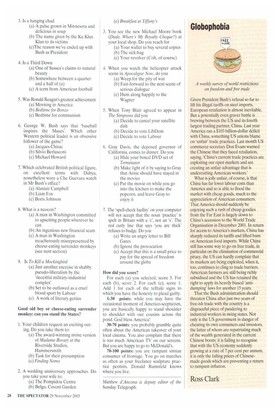Globophobia
A weekly survey of world restrictions on freedom and free trade Given President Bush's refusal so far to lift his illegal tariffs on steel imports, European retaliation is almost inevitable. But a potentially even graver battle is brewing between the US and its fourth largest trading partner, China. Last year America ran a $103 billion-dollar deficit with China, something US unions blame on 'unfair' trade practices. Last month US commerce secretary Don Evans warned the Chinese that they faced retaliation, saying, 'China's current trade practices are exploiting our open markets and are creating an unfair advantage that is undercutting American workers.'
What is jolly unfair, of course, is that China has far lower labour costs than America and so is able to flood the market with cheap goods, much to the appreciation of American consumers. That America should suddenly be enjoying such a rush of cheap goodies from the Far East is largely down to China's accession to the World Trade Organisation in December 2001. In return for access to America's markets, China has sharply reduced its tariffs and lifted bans on American food imports. While China still has some way to go on free trade, in particular on the elimination of commercial piracy, the US can hardly complain that its markets are being exploited, when it, too, continues to cling to trade barriers. American farmers are still being richly subsidised and the US has retained the right to apply its heavily biased 'antidumping' laws for another 15 years.
That the Bush administration should threaten China after just two years of free-ish trade with the country is a disgraceful piece of pandering to industrial workers in swing states. Not only is the US government in danger of cheating its own consumers and investors, the latter of whom are repatriating much of the wealth generated in the current Chinese boom; it is failing to recognise that with the US economy suddenly growing at a rate of 7 per cent per annum, it is only the falling prices of Chinesemade goods which are preventing a return to rampant inflation.
Ross Clark


























































































 Previous page
Previous page